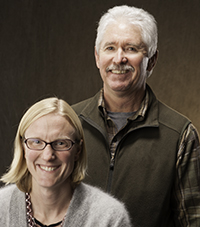
Sara Brown and Craig Conley
Las Vegas, N.M. — New Mexico Highlands University was awarded a $50,000 grant to purchase state-of-the-art field and laboratory instruments to conduct land use research on the Mora River in the new Rio Mora National Wildlife Refuge.
The research site for the grant is part of the former Wind River Ranch, which is 26 miles north of the university’s main campus. The research is aimed at determining the effects land use and restoration activities have on the quality and quantity of water in the Mora River.
The New Mexico Experimental Program to Stimulate Competitive Research, or EPSCoR, awarded the seed grant to Highlands. The National Science Foundation funds New Mexico EPSCoR, a collaborative initiative for climate change research.
Forestry professor Craig Conley is the principal investigator for the grant. The co-investigators are forestry professor Sara Brown and natural resources professor Edward Martinez.
“The main purpose of this new instrumentation is to engage students in additional field and laboratory research at Highlands,” Conley said. “With this research, we’re looking at how the Mora River handles and stores water and how the drainage areas store water in the soil. We’re studying the resiliency of the landscape in the face of a variety of disturbances, both natural and human created.
“Extensive restoration of a section of the Mora River when it was part of Wind River Ranch gives us a unique opportunity to study how ecological systems respond to restoration,” Conley said.
Conley’s research will focus on moisture in soils and stream morphology, or shape; Brown’s research will focus on fire history and the impact of juniper and piñon encroachment; and Martinez’ research will focus on water quality and quantity.
The project will involve a combination of field sampling, lab analysis, and long-term environmental monitoring, with students involved at every stage.
Brown is the newest faculty member of the three professors and joined Highlands University in 2011. She earned her Ph.D. in ecology with a minor in natural resources from the University of Wyoming.
“This research project has implications for watershed management and restoration, how climate change will affect drought, and how drought will impact the landscape in terms of soil, river systems, and the plants that rely on soil and water,” Brown said. “There is a niche in this research project for any student interested in ecology.”
The EPSCoR seed grant will fund new research instruments for the professor’s research labs at Highlands, as well as field instruments. Conley has a soil lab, Brown has a dendrochronology lab for studying tree rings, and Martinez has a water quality lab.
Some instruments the grant will help purchase include a field soil sensor that measures water in soil, and a lab water potential meter that measures how soil holds water.
Another field instrument is an increment borer that extracts 1/8-inch samples of tree rings to analyze growth patterns. Other field instruments include a velocity meter that gives real-time measurements of stream water movement and quantity, and a sonde that takes real-time water quality measurements like temperature, pH and dissolved oxygen.
“The nice thing about these real-time instruments is you can program them to collect data at different intervals, so you can measure how a specific land use impacts the river from minutes to seasons,” Martinez said. “These instruments will give students the opportunity to use cutting-edge equipment to ask new scientific questions.”
In 2009, Highlands University was awarded a $631,548 EPSCoR grant and Martinez is the principal investigator. Since then, Highlands was awarded three $50,000 EPSCoR seed grants.
“The initial EPSCoR grant and the three additional seed grants have had a huge impact on our research capacity at Highlands, especially for supporting undergraduate research,” Martinez said. “Since 2009, more than 40 Highlands University students have participated in EPSCoR-funded research, which is ongoing.”
